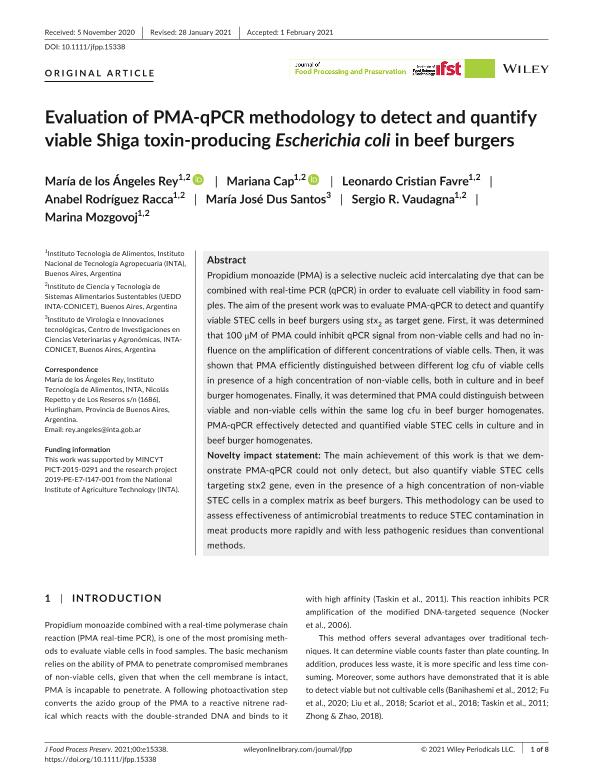Artículo
Evaluation of PMA-qPCR methodology to detect and quantify viable Shiga toxin-producing Escherichia coli in beef burgers
Rey, María de Los Ángeles ; Cap, Marina; Favre, Leonardo Cristian
; Cap, Marina; Favre, Leonardo Cristian ; Rodríguez Racca, Anabel; Dus Santos, María José
; Rodríguez Racca, Anabel; Dus Santos, María José ; Vaudagna, Sergio Ramon
; Vaudagna, Sergio Ramon ; Mozgovoj, Marina Valeria
; Mozgovoj, Marina Valeria
 ; Cap, Marina; Favre, Leonardo Cristian
; Cap, Marina; Favre, Leonardo Cristian ; Rodríguez Racca, Anabel; Dus Santos, María José
; Rodríguez Racca, Anabel; Dus Santos, María José ; Vaudagna, Sergio Ramon
; Vaudagna, Sergio Ramon ; Mozgovoj, Marina Valeria
; Mozgovoj, Marina Valeria
Fecha de publicación:
02/2021
Editorial:
Wiley Blackwell Publishing, Inc
Revista:
Journal of Food Processing and Preservation
ISSN:
0145-8892
Idioma:
Inglés
Tipo de recurso:
Artículo publicado
Clasificación temática:
Resumen
Propidium monoazide (PMA) is a selective nucleic acid intercalating dye that can be combined with real-time PCR (qPCR) in order to evaluate cell viability in food samples. The aim of the present work was to evaluate PMA-qPCR to detect and quantify viable STEC cells in beef burgers using stx2 as target gene. First, it was determined that 100 µM of PMA could inhibit qPCR signal from non-viable cells and had no influence on the amplification of different concentrations of viable cells. Then, it was shown that PMA efficiently distinguished between different log cfu of viable cells in presence of a high concentration of non-viable cells, both in culture and in beef burger homogenates. Finally, it was determined that PMA could distinguish between viable and non-viable cells within the same log cfu in beef burger homogenates. PMA-qPCR effectively detected and quantified viable STEC cells in culture and in beef burger homogenates. Novelty impact statement: The main achievement of this work is that we demonstrate PMA-qPCR could not only detect, but also quantify viable STEC cells targeting stx2 gene, even in the presence of a high concentration of non-viable STEC cells in a complex matrix as beef burgers. This methodology can be used to assess effectiveness of antimicrobial treatments to reduce STEC contamination in meat products more rapidly and with less pathogenic residues than conventional methods.
Palabras clave:
STEC
,
Propidium monoazide
,
Viability
,
qPCR
Archivos asociados
Licencia
Identificadores
Colecciones
Articulos (ICYTESAS)
Articulos de INSTITUTO DE INVESTIGACION DE LA CADENA LACTEA
Articulos de INSTITUTO DE INVESTIGACION DE LA CADENA LACTEA
Citación
Rey, María de Los Ángeles; Cap, Marina; Favre, Leonardo Cristian; Rodríguez Racca, Anabel; Dus Santos, María José; et al.; Evaluation of PMA-qPCR methodology to detect and quantify viable Shiga toxin-producing Escherichia coli in beef burgers; Wiley Blackwell Publishing, Inc; Journal of Food Processing and Preservation; 45; 4; 2-2021; 1-8
Compartir
Altmétricas



